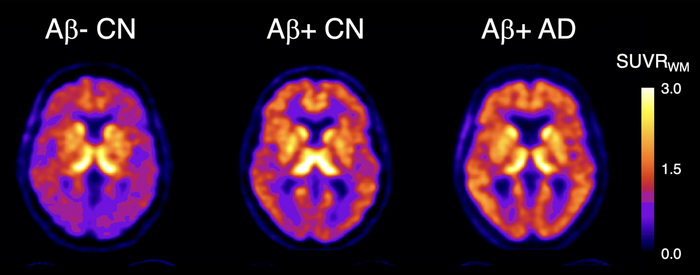
18F-SMBT-1 PET studies showed that beta-amyloid+ Alzheimer’s disease (AD) patients, but most importantly, beta-amyloid+ controls (CN) have significantly higher regional 18F-SMBT-1 binding than beta-amyloid- CN, with 18F-SMBT-1 retention highly associated with beta-amyloid burden. These findings suggest that increased 18F-SMBT-1 binding is detectable at the preclinical stages of beta-amyloid accumulation. Image created by Victor Villemagne, MD, Professor of Psychiatry at the University of Pittsburgh.
October 18, 2023 — The Centers for Medicare and Medicaid Services (CMS) announced it will no longer require coverage with evidence development (CED) for beta-amyloid positron emission tomography (PET) dementia care use. CMS will now allow local Medicare Administrative Contractors (MACs) to determine coverage for these exams.
Medicare beneficiaries can potentially benefit from multiple scans over a lifetime to monitor the extent of amyloid plaque deposits.
The American College of Radiology (ACR) has tracked the movement of this national coverage determination (NCD) as previously reported and has advocated for removing existing barriers and providing broader access to beta-amyloid PET imaging for Alzheimer's Disease (AD) diagnosis, management and evaluation of newly approved therapies.
ACR CRI PET Research
Dating back to the co-founding of the National Oncologic PET Registry (NOPR) in 2006, the ACR Center for Research and Innovation (CRI) has managed several clinical research studies and registries regarding evidence development and PET imaging use.
Most recently, the ACR serves as the sponsor and operating center for the Imaging Dementia—Evidence for Amyloid Scanning (IDEAS) and subsequent New IDEAS Study. To date, these studies have provided access to diagnostic beta-amyloid PET imaging for a combined 20,000 Medicare beneficiaries as a covered procedure.
A recently published primary analysis of the IDEAS study showed that, 90 days after beta-amyloid PET, patient care plans were changed (compared to pre-PET plan) in more than 60% of patients initially characterized as having mild cognitive impairment, and 63% of patients initially characterized as having dementia of unknown cause. Hence, beta-amyloid PET was associated with substantial subsequent changes in the management of diagnostically challenging patient cognitive disorders.
Implementation Next Steps
Now that existing coverage restrictions have been reduced, physicians should notify patients of the availability of this scan. There may be a lag in actual reimbursement of claims until MACs update their claims processing systems.
However, CMS will instruct all MACs to reimburse claims retroactively to the date the final decision memoranda was released. A Change Request (CR) transmittal and an MLN Matters article will be released by CMS that provides instructions to providers and MACs about the implementation of the final NCD policy and updates the Medicare Claims Processing Manual.
ACR staff will continue to update members as further information is released.
For more information: www.acr.org


 July 30, 2024
July 30, 2024 








